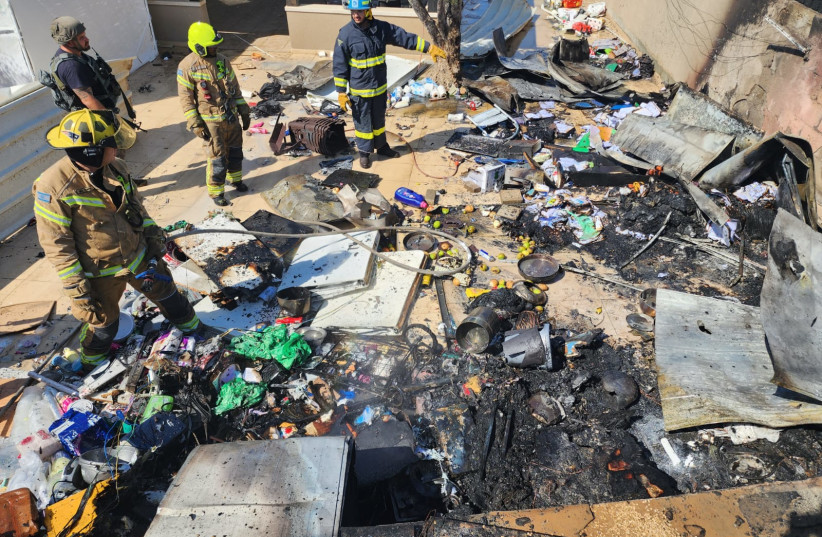As I sit at the volunteer center in Petah Tikva, it’s been nine days and counting; and I’ve been coordinating donations and needs. Volunteers are pouring in, bringing an abundance of supplies, equipment, and funds. The willingness of people to help is overwhelming, and it showcases the true beauty of the Israeli spirit.
Israel has faced an unprecedented blow, one that feels like our second Yom Kippur. How did this happen to us? It’s a question that fills my heart with anger and shame. Although I know, without a doubt that we will prevail, our country will never be the same.
The full extent of the surprise attack that began on Saturday, October 7, on the holiday of Simchat Torah, is only becoming clear now. Hamas conducted a brutal attack against civilians, butchering over 1,300, kidnapping well over 100 – children, the elderly, and families.
Setting houses on fire with their inhabitants inside is a horrifying practice that evokes memories of Nazi Germany. The October 7 attack reveals to the world that Hamas is an organization akin to ISIS, one that must be defeated on the battlefield. Such acts as they have committed leave no room for other solutions.
Israel failed to understand Hamas's capabilities
Yet, we cannot escape from questioning ourselves. We must confront our misconceptions about Hamas and the reasons we were caught off guard. We have to admit that we failed at all levels: intelligence, operations, and strategy. It raises the obvious question: How was it possible for such a massive attack, planned over many months, to go unnoticed by Israeli intelligence? And once surprised, how did we end up with an inadequate number of security forces on the Gaza front, and why did this continue for long hours? What was prioritized? Was it a necessity?

But alongside those questions, fundamental questions pertain to our strategic thinking. How did we fail to understand Hamas? The idea that we could contain the threat from Gaza, calm tensions by fund transfers and allowing the entry of workers into Israel, or “manage the conflict” has clearly failed.
Did we grow accustomed to a “low-intensity” conflict interrupted occasionally by rocket attacks and violent protests along the fence, to the point where we couldn’t envision an attack of this magnitude? Is it possible we didn’t really believe in their capacity to act like ISIS?
The news is too difficult to watch and infuriating.
I, like many, have no faith in our leadership and its integrity. This is a result of many years of negligence and damage to governmental and public systems, of unprofessional management and of twisted priorities, of treating the Israeli budget as their own piggy bank in the most cynical way, to serve very narrow needs. There was no national responsibility. As the families of the kidnapped civilians gather to protest outside the Defense Ministry, their eyes reflect nothing but sheer anger.
In any other crisis, we usually allow the government to complete its tasks before holding those responsible accountable. We may appoint investigation committees and demand resignations afterward. However, the current disaster is of such magnitude, the crisis so deep, that we no longer have faith in their ability to lead us through this battle. The prevailing sentiment is that this government is incapable of even that. When I hear that there’s already a “battle over the narrative,” it frustrates me. Those who believe they can evade responsibility engage in narrative warfare. The formation of an emergency government, a long-overdue necessity, now feels as if they are doing us a favor.
I am a mother to an 18-year-old son who will soon join the army, and I can’t help but question what I am sending him into, and why. The harsh truth is that not serving in the army is not an option. It is stronger than me. It’s part of who we are and our identity. And he chooses to serve because these are the values he was raised upon, by me.
It’s painful to write these lines, and even more so after 10 months of internal rift incited by the current Israeli government. There were early warnings about how our enemies perceived the internal rift generated by the judicial overhaul as a sign of weakness. But Hamas was wrong.
If we failed to read Hamas, Hamas itself failed to read Israeli society and spirit.
I knew all along that everyone in Israel, absolutely everyone, would report to the front in the moment of truth. Pilots, fighters, protesters, Right, Left. We may argue internally, but when facing our enemies, we will always put our differences aside. It unites us.
That’s why I believe Hamas and its supporters, Iran and Hezbollah (who may have been involved in the planning, giving Hamas the Achitophel advice), have made a grave mistake by launching this terror attack on Israel. I wonder what they were trying to achieve? What is their end game, a game changer? Perhaps they wanted a prisoner exchange deal?
This act only widens the distance from those goals. I understand Iran and Hezbollah are looking to escalate the Israeli-Palestinian conflict. It serves their agenda. But does Hamas genuinely believe that such an act will benefit the Palestinian cause?
I believe they’ll discover that they may have won this battle, but they are on the path to losing the war.
The writer is a former analyst at the Prime Minister’s Office, and currently a member of the Devorah Forum.
